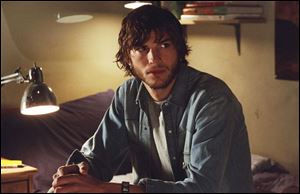
Movie review: The Butterfly Effect ***
1/23/2004
Ashton Kutcher is quite good as Evan, in turns bewildered, determined, scared, and cocky.
If ever a movie trailer produced a case of skepticism, it was for "The Butterfly Effect." Ashton Kutcher, that '70s guy, in a sci-fi thriller? Sounds like a case of the audience being punk'd.
Surprise, surprise. "Butterfly" has wings, and it flies.
The story is one of time travel, a topic that seems to pop up in movies on a fairly regular basis from the "Back to the Future" films of the 1980s to last year's "Timeline."
What makes "The Butterfly Effect" a cut above the ordinary is that the setup by Eric Bress and J. Mackye Gruber, the writers and directors, is so carefully executed, it's easy to suspend disbelief and accept the premise, at least while the theater is dark and the action is under way. The plot may fray at the edges upon careful examination, but it works when it counts.
Kutcher plays a college psychology major named Evan who is fascinated by memory, perhaps because there are great gaping holes in his. When he was a youngster, Evan suffered from periods of not being aware of what was going on, and he would often return to awareness to discover a knife in his hand or something similarly traumatic.
As part of his therapy, Evan was ordered to keep journals to help jog his memory, journals he hasn't read in years.
When college-student Evan rediscovers the journals, he is transported back in time - literally - to the summer he was 13 and his friends Tommy, Lenny, and especially Kayleigh came to turning points in their lives. The friendship -and some of the friends - were damaged that summer, and Evan isn't sure why, but with the help of the journals, he becomes determined to reclaim some of his memories and rectify some of the wrongs.
The problem is, the harder Evan tries to make things better in the past for Tommy, Lenny, and Kayleigh, the more unexpected the results in the current time.
In one scenario, the bright, perky Kayleigh has become a tired, chain-smoking waitress, worn down by her cares and old before her time. In another, she is a college co-ed and one of the leaders of her sorority. This would seem to be a good thing, but the other effects are skewed.
There are surprises in "The Butterfly Effect," especially because it keeps revisiting two scenes. The way they play out is different each time as Evan desperately tries to figure out how to make things better and which is the "real" reality.
And there are chills aplenty, chills that build on all of the scenerios that have come before. These are not the frights of, say, "Darkness Falls," where a supernatural slasher is stalking the heroes. These are the horrors of bad parenting and paths not taken.
Kutcher is quite good as Evan, in turns bewildered, determined, scared, and cocky. He breaks away from the label of Demi's boy-toy and his television persona enough to show a great deal of potential.
Co-starring are Amy Smart ("Roadtrip," "Outside Providence") as Kayleigh, Evan's much-loved friend, who is just as much a lost soul as he is, William Lee Scott as Tommy, Kayleigh's brother and the cause of much of the movie's trauma, and Elden Henson as Lenny, Evan's best friend who is as much, or more, a victim as any of the others.
"The Butterfly Effect" is a about possibilities, choices, and the consequences of one's actions. While it may be somewhat of a surprise that it's quite entertaining, it's even more of a surprise that it provides points to ponder long after it's over.